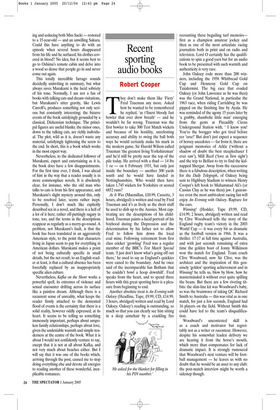Recent sporting audio books
Robert Cooper
They don’t make them like ‘Fiery’ Fred Trueman any more. Asked how he wanted to be remembered he replied, ‘as t’finest bloody fast bowler that ever drew breath’ — and he wouldn’t be far wrong. Trueman was the first bowler to take 300 Test Match wickets and because of his hostility, unrelenting accuracy and ability to swing the ball both ways he would certainly make his mark in the modern game. Sir Harold Wilson called Trueman ‘the greatest living Yorkshireman’ and he’d still be pretty near the top of the pile today. He arrived with a thud — 14 lbs 1 oz — on 6 February 1931, but only just inside the boundary — another 300 yards south and he would have landed in Nottinghamshire. Who would then have taken 1,745 wickets for Yorkshire or scored 6852 runs?
As It Was (Macmillan, £10.99, Cassette, 3 hours, abridged) is written and read by Fred Trueman and it’s as lively as the short stuff he used to dish up to the Aussies. Most captivating are the descriptions of his childhood. Trueman paints a lucid portrait of his boyhood during the Depression and the determination by his father not to allow Fred to follow him down the local coal mine. Following retirement from first class cricket ‘growling’ Fred was a regular member of the BBC’s Test Match Special team. ‘I just don’t know what’s going off out there,’ he used to say as England’s quickies were caned to the boundary. And he once said of the incomparable Ian Botham that ‘he couldn’t bowl a hoop downhill’. Fred speaks from the heart, and to spend three hours with this great sporting hero is a pleasure from beginning to end.
Another absolute treat is An Evening with Oaksey (Headline, Tape, £9.99, CD, £14.99, 3 hours, abridged) written and read by Lord Oaksey. Oaksey’s reading is outstanding, so much so that you can clearly see him sitting in a deep armchair by a crackling fire recounting these beguiling turf memoirsfirst as a champion amateur jockey and then as one of the most articulate racing journalists both in print and on radio and television. Lord O certainly has the qualifications to spin a good yarn but for an audio book to be presented with such warmth and authenticity is very rare.
John Oaksey rode more than 200 winners, including the 1958 Whitbread Gold Cup and Hennessy Gold Cup on Taxidermist. The big race that evaded Oaksey (or John Lawrence as he was then) was the Grand National, in particular the 1963 race, when riding Carrickbeg he was pipped on the finishing line by Ayala. He was reminded of the agony 15 years later by ‘a grubby, shambolic little man’ emerging from the gents at Piccadilly Circus Underground Station with, ‘ I know you! You’re the boogger who got tired before yer ’orse!’ But don’t just expect a sequence of horsey anecdotes — far from it; there are poignant memories of Arkle (‘without a shadow of doubt the best steeplechaser I ever saw’), Mill Reef (‘love at first sight’) and the trip to Belfast to try to find the kidnapped Shergar. Away from the racecourse there is a fabulous description, when writing for the Daily Telegraph, of Oaksey being sent to Highbury Stadium to witness Henry Cooper’s left hook to Muhammad Ali’s (or Cassius Clay as he was then) jaw. I guarantee even the most ambivalent racing fan will enjoy An Evening with Oaksey. Rapture for the ears.
Winning! (Hodder, Tape £9.99, CD, £14.99, 2 hours, abridged) written and read by Clive Woodward tells the story of the England rugby team’s victory in the 2003 World Cup — it was every bit as dramatic as the football version in 1966. It was a thriller. 17-17 at full time against Australia, and with just seconds remaining of extra time the golden boot of Jonny Wilkinson won the match for England. Team coach Clive Woodward, now Sir Clive, was the architect and the inspiration of this genuinely ‘golden’ sporting achievement and in Winning! he tells us, blow by blow, how he masterminded it without ever quite spilling the beans. But there are a few riveting titbits: the slim-line kit was Woodward’s baby, so was the brainwave of taking QC Richard Smith to Australia — this was vital as in one match, for just a few seconds, England had 16 players on the field. Without Smith this could have led to the team’s disqualification.
Woodward’s uncontested skill is as a coach and motivator but regrettably not as a writer or raconteur. However, despite his somewhat leaden delivery we are hearing it from the horse’s mouth, which more than compensates for lack of dramatic impact. It is strongly rumoured that Woodward’s next venture will be football management — he leaves us with no doubt that he would be an asset to any club; the post-match interview might be worth a sidestep though.







































 Previous page
Previous page